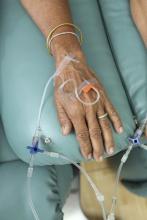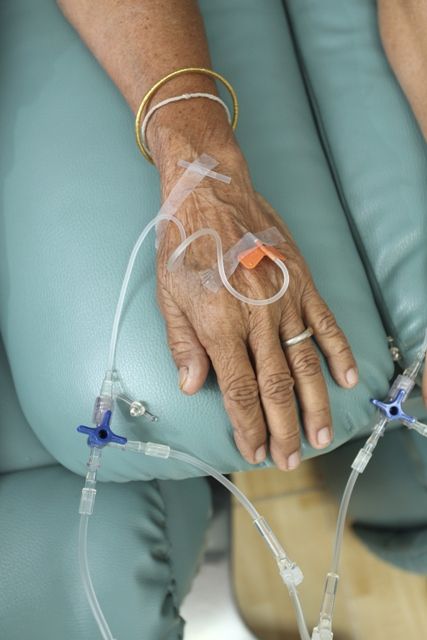User login
Patients undergoing chemotherapy for non-Hodgkin lymphoma (NHL) report feeling isolated and uncertain, and in some cases suicidal, according to a small qualitative study.
Daren Chircop, MS, and Josianne Scerri, PhD, of the University of Malta performed in-depth interviews with four men and two women with aggressive NHL who were midway through CHOP chemotherapy at a cancer center in Malta.
The findings, which were published in the European Journal of Oncology Nursing, highlight three overarching themes. Patients reported that they felt like they were living on an “emotional roller coaster, they were becoming dependent on others, and they were facing an uncertain future.
Specifically, being admitted to a hospital for chemotherapy brought on a fear of the unknown. While being released from the hospital caused anxiety about what would happen once they left the around-the-clock care of doctors and nurses.
The side effects of the chemotherapy – particularly fatigue – led to feelings of being dependent of others and a fear of becoming a burden to families, and even to nurses.
For four of the patients, who were not allowed to leave their hospital rooms during treatment, they reported feeling “imprisoned” and isolated.
Uncertainty was another common theme, with all of the patients reporting that they did not know if they would recover from their cancer and feeling that they had no control over the future.
Additionally, two of the patients experienced suicidal thoughts related to the side effects of treatment.
While many of these feelings are similar to reports by patients with other types of cancer, the researchers suggested that NHL patients experience a greater sense of isolation because they may not be able to leave their hospital rooms while undergoing chemotherapy due to a higher risk of infection.
“There is the need for ongoing psychological support to be available throughout the treatment period,” the researchers wrote. “Moreover, as NHL patients are affected both physically and emotionally whilst undergoing chemotherapy, the engagement of these individuals in some physical activity could be of benefit to them.”
There was no outside funding for the study and the researchers reported having no financial disclosures.
SOURCE: Chircop D et al. Eur J Oncol Nurs. 2018 Aug;35:117-21.
Patients undergoing chemotherapy for non-Hodgkin lymphoma (NHL) report feeling isolated and uncertain, and in some cases suicidal, according to a small qualitative study.
Daren Chircop, MS, and Josianne Scerri, PhD, of the University of Malta performed in-depth interviews with four men and two women with aggressive NHL who were midway through CHOP chemotherapy at a cancer center in Malta.
The findings, which were published in the European Journal of Oncology Nursing, highlight three overarching themes. Patients reported that they felt like they were living on an “emotional roller coaster, they were becoming dependent on others, and they were facing an uncertain future.
Specifically, being admitted to a hospital for chemotherapy brought on a fear of the unknown. While being released from the hospital caused anxiety about what would happen once they left the around-the-clock care of doctors and nurses.
The side effects of the chemotherapy – particularly fatigue – led to feelings of being dependent of others and a fear of becoming a burden to families, and even to nurses.
For four of the patients, who were not allowed to leave their hospital rooms during treatment, they reported feeling “imprisoned” and isolated.
Uncertainty was another common theme, with all of the patients reporting that they did not know if they would recover from their cancer and feeling that they had no control over the future.
Additionally, two of the patients experienced suicidal thoughts related to the side effects of treatment.
While many of these feelings are similar to reports by patients with other types of cancer, the researchers suggested that NHL patients experience a greater sense of isolation because they may not be able to leave their hospital rooms while undergoing chemotherapy due to a higher risk of infection.
“There is the need for ongoing psychological support to be available throughout the treatment period,” the researchers wrote. “Moreover, as NHL patients are affected both physically and emotionally whilst undergoing chemotherapy, the engagement of these individuals in some physical activity could be of benefit to them.”
There was no outside funding for the study and the researchers reported having no financial disclosures.
SOURCE: Chircop D et al. Eur J Oncol Nurs. 2018 Aug;35:117-21.
Patients undergoing chemotherapy for non-Hodgkin lymphoma (NHL) report feeling isolated and uncertain, and in some cases suicidal, according to a small qualitative study.
Daren Chircop, MS, and Josianne Scerri, PhD, of the University of Malta performed in-depth interviews with four men and two women with aggressive NHL who were midway through CHOP chemotherapy at a cancer center in Malta.
The findings, which were published in the European Journal of Oncology Nursing, highlight three overarching themes. Patients reported that they felt like they were living on an “emotional roller coaster, they were becoming dependent on others, and they were facing an uncertain future.
Specifically, being admitted to a hospital for chemotherapy brought on a fear of the unknown. While being released from the hospital caused anxiety about what would happen once they left the around-the-clock care of doctors and nurses.
The side effects of the chemotherapy – particularly fatigue – led to feelings of being dependent of others and a fear of becoming a burden to families, and even to nurses.
For four of the patients, who were not allowed to leave their hospital rooms during treatment, they reported feeling “imprisoned” and isolated.
Uncertainty was another common theme, with all of the patients reporting that they did not know if they would recover from their cancer and feeling that they had no control over the future.
Additionally, two of the patients experienced suicidal thoughts related to the side effects of treatment.
While many of these feelings are similar to reports by patients with other types of cancer, the researchers suggested that NHL patients experience a greater sense of isolation because they may not be able to leave their hospital rooms while undergoing chemotherapy due to a higher risk of infection.
“There is the need for ongoing psychological support to be available throughout the treatment period,” the researchers wrote. “Moreover, as NHL patients are affected both physically and emotionally whilst undergoing chemotherapy, the engagement of these individuals in some physical activity could be of benefit to them.”
There was no outside funding for the study and the researchers reported having no financial disclosures.
SOURCE: Chircop D et al. Eur J Oncol Nurs. 2018 Aug;35:117-21.
FROM EUROPEAN JOURNAL OF ONCOLOGY NURSING
Key clinical point:
Major finding: Patients reported three themes while undergoing chemotherapy: living an emotional roller coaster, becoming dependent on others, and facing an uncertain future.
Study details: A qualitative study of six adults patients with non-Hodgkin lymphoma who were undergoing chemotherapy.
Disclosures: There was no outside funding for the study and the researchers reported having no financial disclosures.
Source: Chircop D et al. Eur J Oncol Nurs. 2018 Aug;35:117-21.

